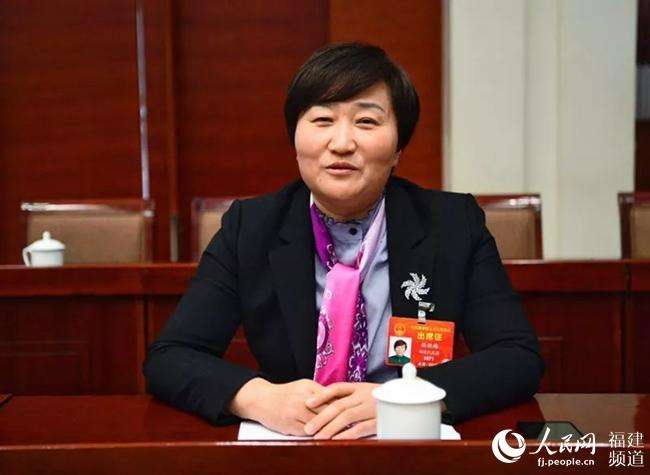Sanitation Worker Makes Grassroots Voices Heard at National Legislature
 |
| Hou Yanmei [Zhou Song/People.cn] |
FUZHOU, June 29 (Xinhua) — At 3 a.m. Hou Yanmei arrives at a refuse transfer station, puts on a blue uniform, and starts beavering away at the underground plant until 7, when the city wakes up, and the neighborhood is alive with joggers and whizzing cars.
As the manager of Dafeng Refuse Transfer Station in downtown Fuzhou, east China's Fujian Province, Hou is responsible for coordinating garbage trucks and overseeing the trucks' cleaning. About 100 tonnes of garbage collected from nearby communities are compressed in the station, and then transferred to disposal plants.
Aside from the daily routine, the sanitation worker performs another duty: a national lawmaker.
In 2018, Hou was elected a deputy to the National People's Congress (NPC), China's national legislature. Lawmakers in China listen to voices from all walks of life, do research, submit proposals, and vote on bills.
However, some 25 years ago, she was merely a dropout, working on farmland and growing cash crops such as garlic, cotton, and watermelon in Shandong Province.
"When my father died of cancer in 1994, my siblings were still young and my mother was grief-stricken. I had no choice but to drop out to help support the family," Hou says.
After getting married in 1998, she opened a garment shop in the town while taking care of the family, but it was shut down several years later due to sluggish business.
At the end of 2007, Hou and her husband moved to Hangzhou in Zhejiang Province and took jobs as sanitation workers.
"When I started as a street cleaner, I felt too embarrassed to make eye contact with passers-by because I thought they might look down on me," she says.
Being skilled and hardworking, Hou was promoted to team leader within eight months.
When Hou and her husband were sent to Fuzhou by the sanitary service company in 2012, she designed a standard operating procedure that helped improve efficiency and reduce workload.
When Typhoon Nepartak hit Fujian in 2016, she hurried to the afflicted area with more than 40 co-workers to clean up the felled trees and mud. She did not sleep for three days.
"Other workers could take turns, but I had to be there all the time as the manager," she says. "In fact, I am more experienced in unblocking drains and driving cleaning vehicles than many sanitary workers."
Her warm personality makes her co-workers willing to open up to her, and she always listens attentively to their concerns.
"I like to talk with sanitary workers. I want their voices heard by higher authorities," Hou says.
Over the past two years, she proposed improving sanitation workers' wages and social welfare, and expanding the coverage of workplace injury insurance among sanitation workers. In response to her suggestions, authorities in Fujian have introduced 21 measures to protect the legitimate rights and interests of sanitation workers.
"I am so proud to see my suggestions adopted. But at the same time, I feel a greater sense of responsibility. I have to do more for them," Hou says.
In 2019, Hou spent nearly six months bedridden with an injury after a stack of trash bins fell on her. When discharged from the hospital, she found the process of workplace injury insurance reimbursement to be cumbersome and time-consuming.
After further investigation, Hou found that her issues were not uncommon. In this year's national legislative session in May, she suggested combining health insurance and workplace injury insurance, and streamlining the reimbursement procedure to reduce the financial burden on patients.
Having worked in the sanitation industry for over 10 years, Hou cares not only about the people in this industry, but also the prospects of the industry itself.
In 2017, China's State Council ordered 46 cities across the country to pilot the mandatory classification of household waste, and so began a nationwide campaign on household waste sorting and recycling.
Hou believes waste disposal is equally important to waste classification. This year, she submitted a proposal on building a more efficient garbage sorting and disposal system, and encouraging universities, laboratories, and other institutions to carry out research on garbage disposal.
"As an NPC deputy, I am exposed to new experiences and new ideas every day. I always feel the urge to deepen my research, hear more voices from the grassroots to help sanitation workers and blue-collar workers as a whole," Hou says.
(Source: Xinhua)
Please understand that womenofchina.cn,a non-profit, information-communication website, cannot reach every writer before using articles and images. For copyright issues, please contact us by emailing: website@womenofchina.cn. The articles published and opinions expressed on this website represent the opinions of writers and are not necessarily shared by womenofchina.cn.

 京公网安备 11010102004314号
京公网安备 11010102004314号